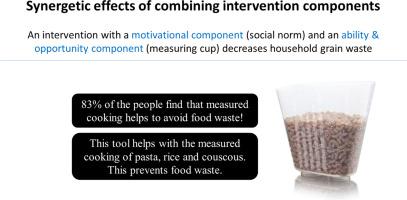减少家庭粮食浪费的实地研究:社会规范和量杯的影响
IF 10.9
1区 环境科学与生态学
Q1 ENGINEERING, ENVIRONMENTAL
引用次数: 0
摘要
家庭食物浪费对环境有重大影响,要减少这种影响,了解不同类型的干预措施(单独或联合)的有效性是关键。为了更好地理解是什么使减少废物干预措施有效,我们需要理清不同干预措施的组成部分。本研究旨在通过运用动机、机会和能力框架来指导有效的干预开发,从而为现有知识做出贡献。在一项二对二的受试者实地研究中(N = 314),将包含动机、机会和能力成分的干预措施的有效性与仅包含动机成分的干预措施和结合了机会和能力成分的干预措施进行了比较。组件的能力。结果表明,只有结合所有MOA成分(量杯与描述性社会规范)的干预才能有效减少家庭粮食浪费(面食、大米、蒸粗麦粉)。这证明了MOA框架在指导干预措施开发方面的有用性。本文章由计算机程序翻译,如有差异,请以英文原文为准。

A field study on the reduction of household grain waste: The effects of social norms and measuring cups
Household food waste has a significant impact on the environment and to diminish this, understanding the effectiveness of different types of interventions, alone and in combination, is key. To better understand what makes waste-reduction interventions effective, we need to disentangle different intervention components. This study aims to contribute to existing knowledge by using the Motivation, Opportunity and Ability framework in guiding effective intervention development. In a two-by-two between subjects field study (N = 314), the effectiveness of an intervention containing a motivational, opportunity and ability component, is compared to an intervention containing only a motivational component and an intervention with a combined opportunity & ability component. Results indicate that only an intervention combining all MOA components (measuring cup with descriptive social norm) effectively reduces household grain waste (pasta, rice, couscous). This demonstrates the usefulness of the MOA framework in directing intervention development.
求助全文
通过发布文献求助,成功后即可免费获取论文全文。
去求助
来源期刊

Resources Conservation and Recycling
环境科学-工程:环境
CiteScore
22.90
自引率
6.10%
发文量
625
审稿时长
23 days
期刊介绍:
The journal Resources, Conservation & Recycling welcomes contributions from research, which consider sustainable management and conservation of resources. The journal prioritizes understanding the transformation processes crucial for transitioning toward more sustainable production and consumption systems. It highlights technological, economic, institutional, and policy aspects related to specific resource management practices such as conservation, recycling, and resource substitution, as well as broader strategies like improving resource productivity and restructuring production and consumption patterns.
Contributions may address regional, national, or international scales and can range from individual resources or technologies to entire sectors or systems. Authors are encouraged to explore scientific and methodological issues alongside practical, environmental, and economic implications. However, manuscripts focusing solely on laboratory experiments without discussing their broader implications will not be considered for publication in the journal.
 求助内容:
求助内容: 应助结果提醒方式:
应助结果提醒方式:


